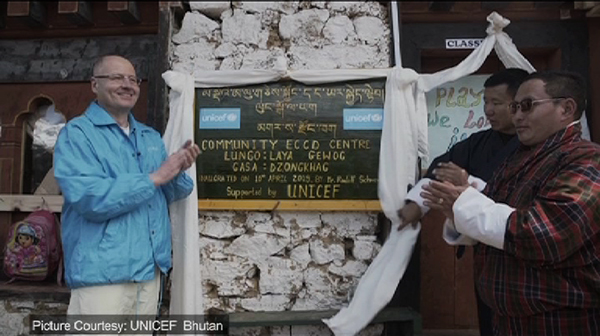 Children of Lungo, a remote village in Laya now have access to early childhood care and development (ECCD) centre. It is for the first time that such a centre has been established at the highest altitude.
Children of Lungo, a remote village in Laya now have access to early childhood care and development (ECCD) centre. It is for the first time that such a centre has been established at the highest altitude.
The centre was started to ensure that children in every corner of the country have the best start in life.
The ECCD centre is situated at an elevation of 4,000 meters above sea level, amidst snow-capped mountains and pristine environment.
15 children of the nomads aged three to five years old learn and play together in the centre. Their day begins at nine in the morning and then break for their homes at two in the afternoon.
“I am very happy to have such a facility in a remote village like ours. It is going to benefit our children a lot. They are going to learn new things at the centre. At home, we cannot give time to them as we get busy with our works,” Pego, a parent from Loong-go, said.
“We have three villages with around 64 households. I think people are fortunate to have such a centre. It’s the first centre and I am hoping it will be of great benefit to everyone here. It is like a building block for better thinking,” Pema Wangchuk, the Tshogpa of Loong-go, said.
They added the centre will not only ensure the safety of the children but also improve their learning ability.
“We start the day at nine in the morning with a welcome song, meditation and we have a session called the question of the day. Then we have mind training which is followed by a break for learning area. And they do social activities and we have various other activities such as storytelling, nap time,” Kinley Om, the centre’s facilitator, said.
The centre which was established with support from UNICEF was inaugurated on April 10.
“It is a moral obligation that children in remote areas like in Lungo have the same opportunities as the children in Thimphu or in Punakha. I think that is also very important for the future of the country to strengthen the human capital of the country, the cognitive capital for a country that has limited natural resources I think this is the best strategy and the best way to invest resources,” Rudolf Schwenk, the Representative of UNICEF Bhutan, said.
A study by the Education Ministry and UNICEF in 2017 showed that children having access to ECCD are far more likely to succeed than those who do not have such access
“The most critical stage of life is the early childhood period which is from conception till age eight. So if we are able to provide substantial support and interventions that can help promote children’s development we would be contributing to every individual’s holistic lifelong development,” Karma Gayleg, the Programme Coordinator, ECCD and SEN Division, said.
The centre is expected to foster the cognitive, intellectual and social development of these children.







